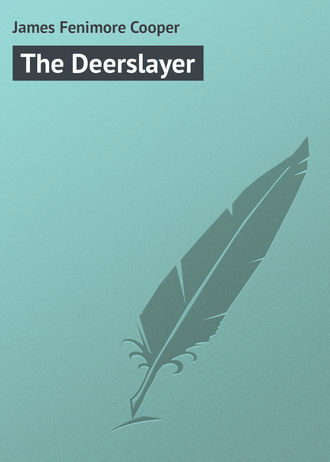
Джеймс Фенимор Купер
The Deerslayer
From the point, the canoe took its way toward the shoal, where the remains of the castle were still visible, a picturesque ruin. The storms of winter had long since unroofed the house, and decay had eaten into the logs. All the fastenings were untouched, but the seasons rioted in the place, as if in mockery at the attempt to exclude them. The palisades were rotting, as were the piles, and it was evident that a few more recurrences of winter, a few more gales and tempests, would sweep all into the lake, and blot the building from the face of that magnificent solitude. The graves could not be found. Either the elements had obliterated their traces, or time had caused those who looked for them to forget their position.
The Ark was discovered stranded on the eastern shore, where it had long before been driven with the prevalent northwest winds. It lay on the sandy extremity of a long low point, that is situated about two miles from the outlet, and which is itself fast disappearing before the action of the elements. The scow was filled with water, the cabin unroofed, and the logs were decaying. Some of its coarser furniture still remained, and the heart of Deerslayer beat quick, as he found a ribbon of Judith’s fluttering from a log. It recalled all her beauty, and we may add all her failings. Although the girl had never touched his heart, the Hawkeye, for so we ought now to call him, still retained a kind and sincere interest in her welfare. He tore away the ribbon, and knotted it to the stock of Killdeer, which had been the gift of the girl herself.
A few miles farther up the lake, another of the canoes was discovered, and on the point where the party finally landed, were found those which had been left there upon the shore. That in which the present navigation was made, and the one discovered on the eastern shore, had dropped through the decayed floor of the castle, drifted past the falling palisades, and had been thrown as waifs upon the beach.
From all these signs, it was probable the lake had not been visited since the occurrence of the final scene of our tale. Accident or tradition had rendered it again a spot sacred to nature, the frequent wars and the feeble population of the colonies still confining the settlements within narrow boundaries. Chingachgook and his friend left the spot with melancholy feelings. It had been the region of their First War Path, and it carried back the minds of both to scenes of tenderness, as well as to hours of triumph. They held their way towards the Mohawk in silence, however, to rush into new adventures, as stirring and as remarkable as those which had attended their opening careers on this lovely lake. At a later day they returned to the place, where the Indian found a grave.
Time and circumstances have drawn an impenetrable mystery around all else connected with the Hutters. They lived, erred, died, and are forgotten. None connected have felt sufficient interest in the disgraced and disgracing to withdraw the veil, and a century is about to erase even the recollection of their names. The history of crime is ever revolting, and it is fortunate that few love to dwell on its incidents. The sins of the family have long since been arraigned at the judgment seat of God, or are registered for the terrible settlement of the last great day.
The same fate attended Judith. When Hawkeye reached the garrison on the Mohawk he enquired anxiously after that lovely but misguided creature. None knew her — even her person was no longer remembered. Other officers had, again and again, succeeded the Warleys and Craigs and Grahams, though an old sergeant of the garrison, who had lately come from England, was enabled to tell our hero that Sir Robert Warley lived on his paternal estates, and that there was a lady of rare beauty in the Lodge who had great influence over him, though she did not bear his name. Whether this was Judith relapsed into her early failing, or some other victim of the soldier’s, Hawkeye never knew, nor would it be pleasant or profitable to inquire. We live in a world of transgressions and selfishness, and no pictures that represent us otherwise can be true, though, happily, for human nature, gleamings of that pure spirit in whose likeness man has been fashioned are to be seen, relieving its deformities, and mitigating if not excusing its crimes.


